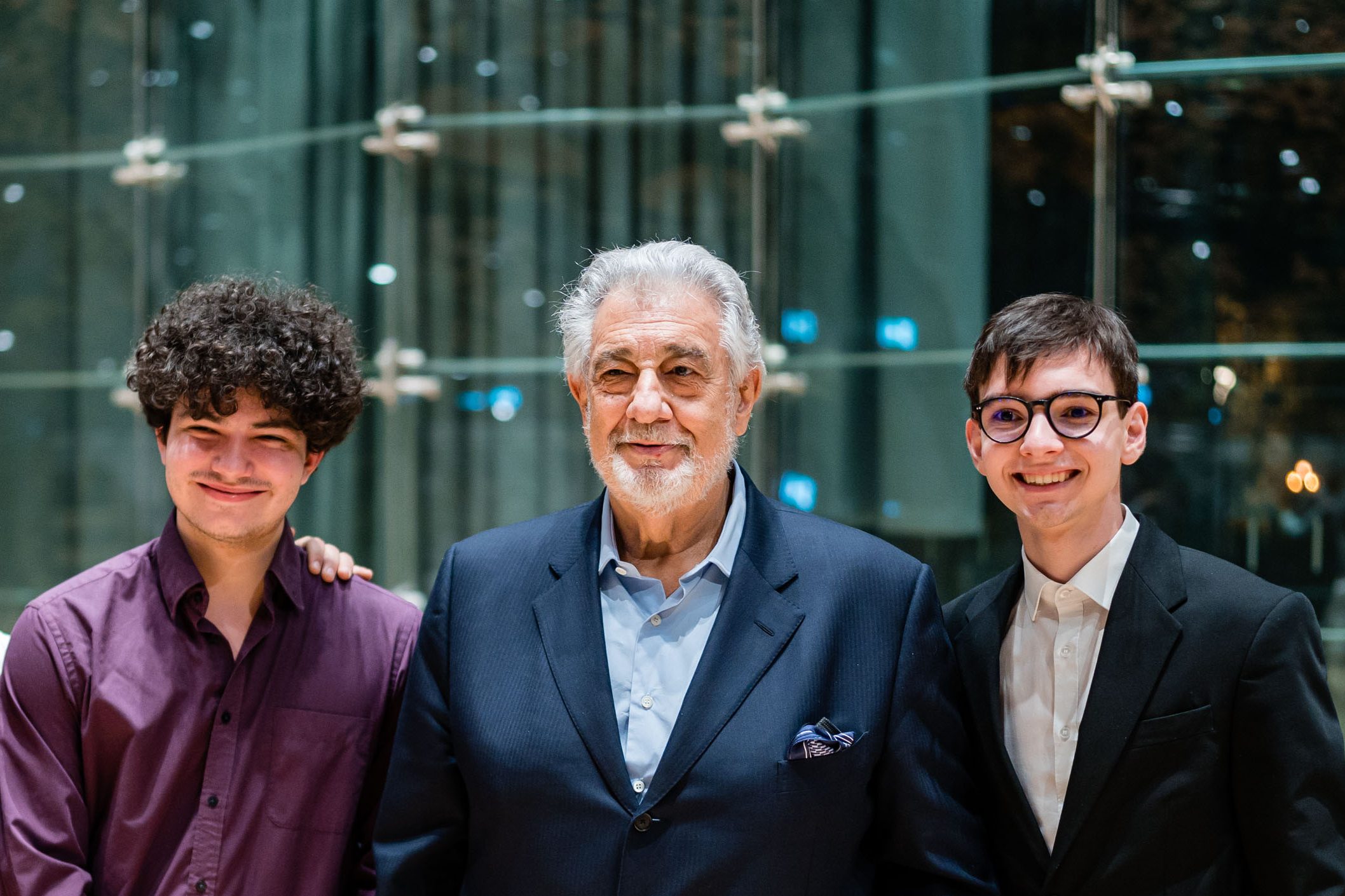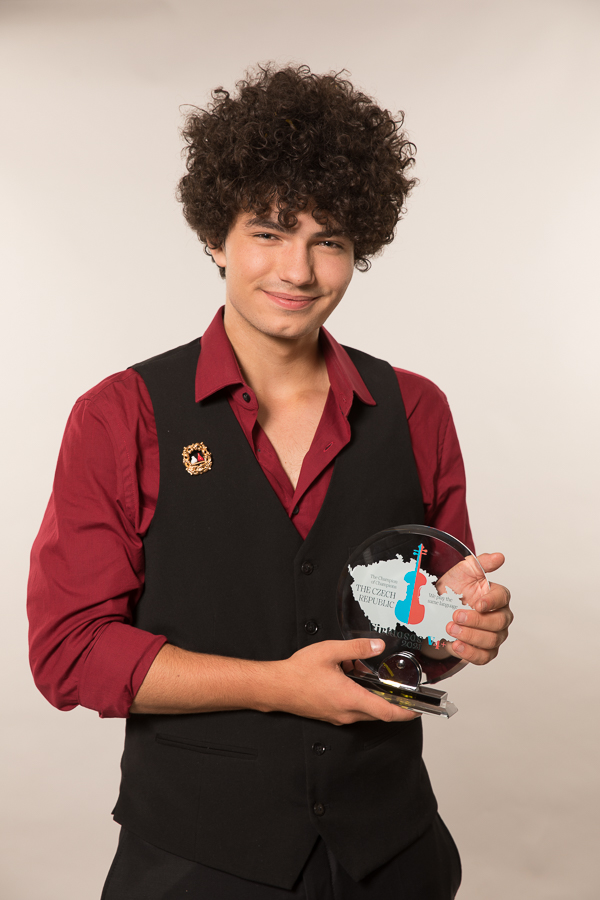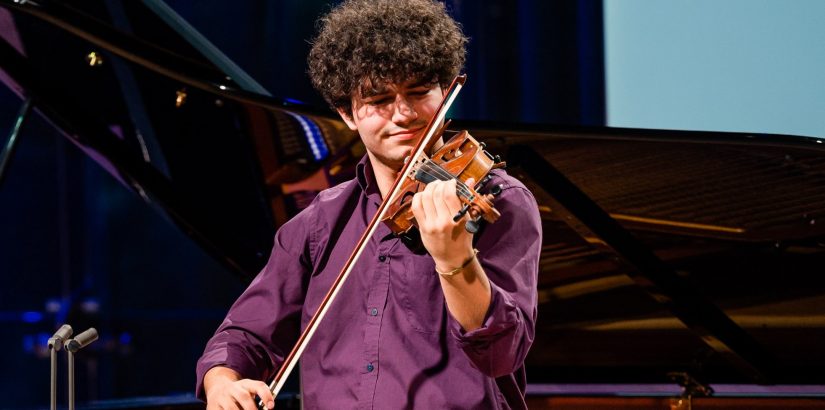-says violinist Daniel Matejča
A coherently told story or even a fairy tale reminds Daniel Matejča of Peter Ilyich Tchaikovsky’s Violin Concerto, which will be performed at this year’s Dvořák Prague.
He first convinced the festival audience of his talent two years ago when he was among the laureates of the Concertino Praga competition. In July, he added a win in the competition organised by Eurovision and also became the Czech winner of international classical music TV talent competition, Virtuosos.
The violinist has recently returned from a holiday in the Italian Dolomites. On the three-thousand-foot massif of Tofana he enjoyed ferrata – i.e. routes with belay on difficult mountain paths. They provided him with plenty of opportunities to relax from everyday worries as well as beautiful experiences.
“I don’t climb very often, I’m not an avid climber, but it’s an interesting kind of relaxation,” says Matejča, for whom the beauty of the trip was also the perfect change from the worries he had to deal with. The only thing that mattered all week was where everyone was going to sleep, or what they were going to eat and drink. “It’s a completely reversed way of spending my time than at home, where I have to decide when I’m going to practice, when I’m going to send in a paper, when I’m going to go to school and so on,” smiles the violinist, continuing, “In the mountains, these ‘basic’ things were the main concern, and I enjoyed that.”

Even Professor Ivan Štraus, with whom the 17-year-old Matejča is studying at Prague’s HAMU, accepts his more demanding tourist activities. “My hands do get a workout when climbing, but I’m careful, I don’t gamble with my life or my health, and Mr Štraus is quite OK with it,” explains the violinist, noting that good physical condition is a big plus for a musician.
Finding the right tone and context
He started playing the violin at the age of four. But a career as a professional violinist was not a childhood dream or a matter of a sudden decision or a sudden break in thinking. “It didn’t happen from one minute to the next, but rather gradually evolved,” says the violinist, who became more passionate about his playing the more he performed. Eventually, he accepted the idea of a professional career as a reality and is now counting on it.
As time went on, he also grew to enjoy not only the basic mastery of the instrument, but the ability to really interpret the music. Complete beginnings are not easy for violinists, and it takes quite a long time for child adepts to coax an acceptable tone out of the instrument.
Matejča’s awareness of a deeper immersion in the pieces he was interpreting grew in intensity as he grew older. “When the professor felt that I was able to pick up the historical and interpretative context, he began to tell me about them in a wonderful way,” recalls the violinist, who over time began to find out the necessary information himself and uses it to study other pieces. At the same time, he appreciates that his teacher usually explains everything even better.
Matejča is very fond of studying the context in which specific compositions were created and considers them much more important than ten hours of practice a day.
“If one practises from morning to evening, with breaks for lunch or dinner, without knowing the historical context or the influence of the environment to which the composer was exposed, the result is always half-hearted,” says the violinist, who believes that the performer must understand the piece at least for the most part.
For Matejča, this was also necessary in the case of Dmitri Shostakovich’s Violin Concerto No.1 in A minor, with which he was the first Czech to win the Eurovision Young Musicians Competition this year. At the same time, however, he admits that he could understand the composer’s situation in 1947-1948 only approximately.
“For me, as a 17-year-old boy, it is impossible to imagine the horrors that took place in the Soviet Union at that time,” explains the violinist, noting with relief that his generation had no chance to experience anything similar. Reading the book Testimonies by Solomon Volkov, he was able to guess what was going through Shostakovich’s mind when he composed it, but fortunately the reality is unimaginable to him. “It was important for me as a means of understanding the work, but I can’t understand the composer in this case,” Matejča admits.
Fairy tales and the magic of the home environment
By contrast, he perceives no oppressive tension or painful strains in Peter Ilyich Tchaikovsky’s Violin Concerto in D major, which he will perform at Dvořák Prague. “I perceive his concerto as one coherent story or even a fairy tale,” smiles the violinist, who loves 20th century music, and Tchaikovsky is, after all, somewhat more distant from him than Shostakovich. “With Tchaikovsky I don’t feel such a deep historical context, but it is compensated by the splendour of the whole work,” explains the musician, and it is no wonder that everyone wants to play this violin concerto.
Matejča, however, is very close to the history of the Rudolfinum, which he perceived two years ago when he participated in the Concertino Praga competition. “It was a huge honour for me and I’m really happy to be back,” Matejča is looking forward to it. He considers a concert at the Rudolfinum one of the greatest honours a musician from the Czech Republic can receive. For this reason he considers his festival concert to be the event of the year.
He sees a fundamental difference between Concertino Praga and the Eurovision Song Contest in the fact that the latter event was televised. “Cameras can make you nervous,” Matejča says, adding that the hall in Montpellier is slightly bigger than the Rudolfinum, so he had a bit more stage fright. He felt better playing in the Rudolfinum, where he feels at home. He also feels the huge energy of the place and the support from the home audience.

They try not to worry about the size of the hall and always give the best performance. But the bigger the hall he plays in, the better he feels inside. This is also due to the greater feedback from the audience, even if the violinist doesn’t feel that it’s all about him when he plays. “The composer is important – I’m just transmitting the music he has created. The main character of the concert is not me, but the composer,” Matejča explains one of the reasons why the audience doesn’t give him any trouble, even though he feels a healthy amount of respect before taking the stage. However, he considers such adrenaline to be necessary and does not pose any obstacle for him.
Among the musical styles that are closest to his heart, Matejča lists Impressionism, Expressionism and Neoclassicism. Among 20th century musicians, the trio of Prokofiev, Shostakovich and Khachaturian is fundamental for him. He is also fond of the Polish composer Karol Szymanowski and admires the music of the Belgian composer and violin virtuoso Eugène Ysaÿe from the turn of the 19th and 20th centuries. Of the Impressionists, Debussy and Ravel appeal to him most.
His last encounter with contemporary music was a recent encounter with the composer Jana Vöröšová. She wrote a piece for him as a supplement to the recording of Ysaÿe’s six sonatas, which he recorded for Supraphon this April. “She recently sent me the sheet music, so as soon as I finish practicing Tchaikovsky, I’ll get to work on Vöröšová.”
The violinist has since finished recording his first CD, which was released in April 2023.
(The original article, written by Boris Klepal, was published in 7. 9. 2022)
